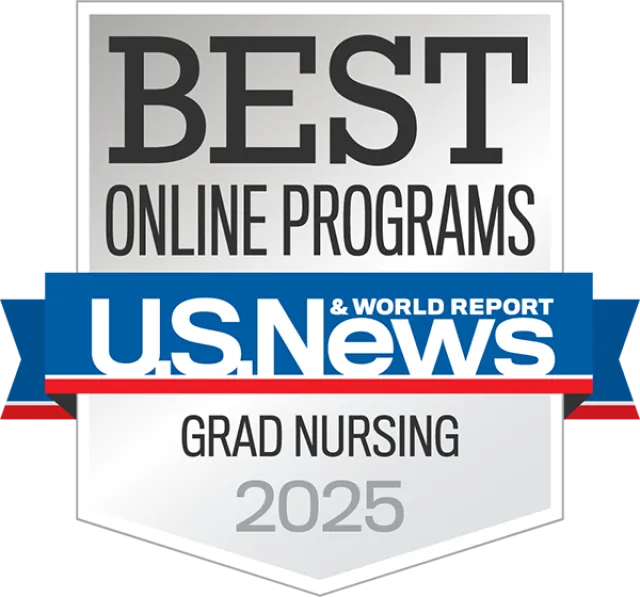Go from MSN to DNP and earn the terminal degree in nursing
| Accreditation | CCNE accredited1, Accredited by the Higher Learning Commission |
|---|---|
| Format | 100% online didactic classes |
| Admissions | Master’s degree in nursing required for admissions |
| Curriculum | Cutting-edge competency-based curriculum to develop your skills in nursing practice scholarship, innovation, and leadership |
| DNP Project | Make your impact on your practice in a culminating DNP Practice Project |
Learn More Today!

Ranked by U.S. News & World Report as one of the best online graduate nursing programs in 2025
Overview: Online Doctor of Nursing Practice (DNP)
The Doctor of Nursing Practice degree (MSN to DNP) is a 32-credit graduate program which prepares the MSN-prepared RN to advance their nursing career to new heights. The degree program provides students with fundamental knowledge and skills in improvement science, technology and nursing informatics in advanced practice, professionalism and leadership for advanced practice, population health, and more.
Career-focused curriculum
Discover the crucial knowledge and skills required to succeed in your work and build a foundation for continued career growth.
Flexible schedule
We work hard to help you maintain school-life balance, striving to be as flexible as possible for busy non-traditional students.
Virtual services
Access to extensive virtual services, including academic advising, tutoring, support services, technical support and library services.
Lifelong support
We support your ongoing career advancement by providing comprehensive, personalized student services with lifelong career coaching.
Rolling admissions
No application deadlines to worry about. Apply when you’re ready and prepare to get started soon.
DNP program classes & curriculum details
Our DNP program, developed in compliance with the model for advanced nursing education of the AACN new Essentials (2006, 2021), implements a competency-based program structure:
Build
Develop a strong conceptual framework. Lecture-style coursework amplifies your current knowledge base and introduces concepts and frameworks to expand your understanding.
Engage
Build upon the framework and dive into the literature, evidence, and tools of nursing practice. Engage the evidence and appraise its utility. Identify opportunities for improvement and learn to design and implement methodologies to address them.
Apply
Apply practice tools at the highest level. Challenge and expand your knowledge base through clinical applications, complete your DNP project, and graduate ready to continue your professional journey to the top of your practice.
i. Average number of months for students to complete the program. Program availability varies by location.
Tuition & Cost
Tuition & Cost
The cost of tuition for the DNP program is $755 per credit.
You can potentially earn even greater savings by transferring credit from prior college coursework, applying for financial aid, or potential partnership opportunities through your employer.
Our goal is your career advancement. That’s why we are always working to improve our curriculum and processes to make our program as affordable as possible while preparing you best for success in your work.
Scholarships & Financial Aid
You may be eligible for multiple scholarships and grants, both through Herzing University and several national scholarship websites.
Military/Veteran Discounts
Veterans, Active Duty U.S. Servicemembers, and spouses may qualify for a 10-20% tuition discount.
Program admission requirements
Prerequisites to enroll in the Herzing University Doctor of Nursing Practice (DNP) program include:
- Unencumbered RN licensure
- Minimum 3.0 GPA
- A master’s degree in nursing (MSN, MN) from a program accredited by the Accreditation Commission for Education in Nursing (ACEN), Commission on Collegiate Nursing Education (CCNE), and or National League of Nursing Commission for Nursing Education Accreditationi
- Current Curriculum Vitae (CV)/résuméii
- Required background check/clinical compliance upon admission
- No GRE required
i. The master’s degree must include preparation for an advanced nursing practice specialty (e.g., Nurse educator, Nursing administration, etc.) or an advanced practice nursing role (NP, CNS, CRNA, CMN). If the master’s degree did not include preparation for an advanced nursing practice specialty or an advanced practice nursing role, the completion of an accredited post-graduate certification program in an advanced nursing practice specialty or an advanced practice nursing role is required prior to admission.
ii. Your CV/résumé should include: focus/topic for your DNP project, site for your DNP project (ideas for what and where to do the project), years of practice experience, community service, references, and experience with any of the following: diversity, equity and inclusion initiatives, initiatives focusing on the social determinates of health, population health initiatives, health-focused partnerships with industry, academia, or local government, research or research translation, quality and safety initiatives, leadership in complex healthcare systems, health information technology/advocacy and/or policy development.
- Alabama
- Alaska
- Arizona
- Arkansas
- California
- Colorado
- Connecticut
- Delaware
- Florida
- Georgia
- Hawaii
- Idaho
- Illinois
- Indiana
- Iowa
- Kansas
- Kentucky
- Louisiana
- Maine
- Maryland
- Massachusetts
- Michigan
- Minnesota
- Mississippi
- Missouri
- Montana
- Nebraska
- Nevada
- New Hampshire
- New Jersey
- New Mexico
- North Carolina
- North Dakota
- Ohio
- Oklahoma
- Pennsylvania
- Rhode Island
- South Carolina
- South Dakota
- Tennessee
- Texas
- Vermont
- Virginia
- West Virginia
- Wisconsin
The DNP Project
The Herzing DNP Practice Project
While the clinical practicum is the key practical component of an MSN program, the DNP Practice Project represents the culmination of your DNP education: put everything you’ve learned into practice and begin making your impact immediately.
You won’t need to find a preceptor. The DNP project is an independent clinical effort facilitated by a Project Chair and Committee.
Key elements of the DNP project include:
- Identify a problem
- Search, analyze, and synthesize literature and evidence
- Translate evidence to build methodology to address the problem
- Plan and implement
- Evaluate the outcomes, process and experience
Upon completion you’ll work closely with your Project Chair to disseminate your findings, from presentation to the practice and University/community events including submission for publication.
What you can do with a DNP degree



Advanced Practice Registered Nurses (APRN) and other master’s-prepared advanced practice nurses can earn a DNP to climb to the highest rung on the career ladder across many different specialties.
Our leadership-focused program is designed to cover a broad set of skills applicable to any advanced practice nursing role you might seek, allowing you to make an impact in your practice, your community or your healthcare system.
You can also potentially increase your earning potential. According to the 2020 National Nursing Workforce Survey, registered nurses whose highest education was a DNP reported a median salary of about $100,000, 11% higher than the $90,000 median for those who had earned as much as a master’s degree.
I haven’t earned an MSN—how can I earn a DNP with Herzing? If you have earned a BSN, you can go from BSN to DNP and pursue an advanced nursing specialty of your choosing. Or you can go from BSN to MSN then enroll in a DNP program in the future.
Waived Enrollment Fee
Discover the educational pathway designed to maximize your career potential. Reach for greater heights with Herzing University.
Faq
Frequently Asked Questions
Didn't find the answer to your question? Send us an inquiry and we will be happy to answer all your questions!
How long it takes depends on the college education you’ve already earned and if you choose a full-time or part-time pathway.
The fastest path would be a situation in which you have earned an MSN and are ready to commit to the DNP program full-time. You can potentially earn your DNP in as few as 24 months (2 years).
Increasingly yes, but it ultimately depends on the institution who issued the degree.
As the popularity of online degrees continues to rapidly trend upward, so has mainstream acceptance of online degree programs.
Attitudes toward online degrees were already becoming more positive before the COVID-19 pandemic forced the issue. According to a 2019 study from Northeastern University, 61 percent of HR leaders say online learning is “of equal or greater quality to more traditional methods.” More than half believe that in the future, most advanced degrees will be online.
Regarding nursing applicants who earned online degrees, there are a few important factors employers consider:
- The school and degree program’s accreditation. Herzing University is accredited by the Higher Learning Commission (HLC) and programmatically accredited by the Commission on Collegiate Nursing Education (CCNE).i
- If you have earned nursing licensure. Our programs are designed to help you pass any necessary exams and become licensed before getting your first job.
- The school’s reputation and history of producing excellent employees. Consider our many happy graduates and 50+ years producing more than 40,000 alumni.
For all these reasons employers know what it means when they see “Herzing University” on a resume!
i. Programmatic accreditation varies by program and by campus location. Find details about all Herzing University accreditations and approvals.
Salaries vary widely across different types of jobs in advanced practice nursing, and earning a DNP can potentially apply to them all. However, earning a DNP can potentially help you compete for higher pay.*
According to the 2020 National Nursing Workforce Survey, registered nurses whose highest education was a DNP reported a median salary of about $100,000, 11% higher than the $90,000 median for those who had earned as much as a master’s degree.
In October of 2004, the American Association of Colleges of Nursing (AACN) endorsed the Position Statement on the Practice Doctorate in Nursing, which recommended moving the current level of preparation needed for advanced nursing practice from the master’s to doctorate level.
The AACN set an initial goal to phase out master’s level prep for APRNs and transition fully to DNP by 2015. That deadline has come and gone, and a master’s level education remains the minimum requirement to practice as an APRN (additional requirements vary per certification).
However, the transition has been discussed for many years—and not only by AACN. The National Organization of Nurse Practitioner Faculties (NONPF) set a goal of 2025 to move all entry-level nurse practitioner education to the DNP degree.
While enrollment in DNP programs has increased continuously for 20 years running as of the AACN’s most recent Annual Survey, a DNP has not yet become required to practice as an APRN.
However, the landscape is changing and the DNP is trending towards becoming the standard for APRNs at the highest level.
The DNP represents the terminal degree in nursing, meaning it’s the highest degree you can earn in nursing. It’s one level higher than the MSN. The main differences include:
- Curriculum differences
- Certification requirements
- Enrollment trends
- Salary potential
- How long it takes to earn
Learn more about the difference between MSN vs. DNP.
Yes! There are many reasons why it’s worth pursuing a DNP, including:
- Reach the height of the nursing profession with the terminal degree in nursing
- Advance your skills regardless of your specialty
- Prepare for future APRN education requirements
- Doctorally-prepared nurses are needed to translate evidence and research
- Earn a key role in improvement science
- Become a better educator/teacher
- The healthcare system needs doctorally-prepared nurses
The DNP is a practice-focused doctoral degree, while a Doctor of Philosophy in Nursing is a research-focused degree. Some key differences include:
- PhD students are trained to develop new knowledge for both the science and practice of nursing, while DNP students learn the skills necessary to translate evidence from the research and put it into practice. Program curriculums vary accordingly.
- PhD students complete a dissertation, while DNP students complete a minimum number of clinical hours and/or a scholarly project
- Credit requirements can vary
- Unique employment opportunities upon graduation
Yes, by earning a doctorate degree you can potentially be referred to as a “doctor.” However, some states may require DNP nurses to fully clarify their role if the title “Dr.” is used.
Even without formal state requirements, you should always clearly disclose your credentials with patients to avoid confusion.
Program Finder
Doctor of Nursing Practice - Post Master's DNP
OnlineTo learn more about this program, click the Request Info button.
Request Information
Ready to get started?
Contact us to request more information
The Student Experience at Herzing
I’ve always wanted to help individuals and families in need. When looking for online schools, I stumbled across Herzing. All the criminal justice courses that I took made me realize that a career helping people is absolutely what I wanted to do with my life.

Tiffany Stevers
Legal Studies | Online CampusAccreditation & Disclosures
1. The Doctor of Nursing Practice (DNP) Program at Herzing University Madison is accredited by the Commission on Collegiate Nursing Education (http://www.ccneaccreditation.org). Herzing University is approved to offer programs in an online learning modality through association with the main campus in Madison, Wisconsin.
Herzing University is accredited by the Higher Learning Commission (hlcommission.org), an institutional accreditation agency recognized by the U.S. Department of Education.
* Bureau of Labor Statistics (BLS), U.S. Department of Labor, Occupational Employment and Wage Statistics 2023 / Occupational Outlook Handbook 2022. BLS estimates do not represent entry-level wages and/or salaries. Multiple factors, including prior experience, age, geography market in which you want to work and degree field, will affect career outcomes and earnings. Herzing neither represents that its graduates will earn the average salaries calculated by BLS for a particular job nor guarantees that graduation from its program will result in a job, promotion, salary increase or other career growth.
Recent Blog Posts
Waived Enrollment Fee
Discover the educational pathway designed to maximize your career potential. Reach for greater heights with Herzing University.






